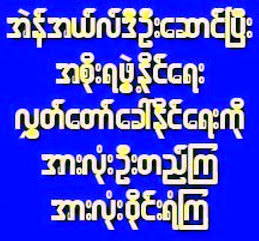The campaign, organized by the student-based “Generation Wave,” despite stepped up security by police and troops.
“The army and riot police are everywhere,” said Burmese clerk who works for an international non-governmental organization in Rangoon. Security was also reportedly tightened in Mandalay.
The anniversary of the uprising and its brutal suppression falls on August 8. Up to 3,000 protesters are thought to have died in clashes with the authorities, while 2,000 arrested during and after the uprising are still in prison.
Moe Thway, a leading member of “Generation Wave” told The Irrawaddy on Monday that the movement had organized the “Red Campaign” to raise awareness among young people of the significance of August 8, 1988.
“We are doing this as evidence that we are not defeated, despite military suppression,” he said. “We young people will continue our struggle for justice and freedom for all Burmese citizens.”
The campaign kicked off as the UN Human Rights Council investigator for Burma, Tomas Ojea Quintana, arrived in Rangoon on his first mission to the country.
Thai, Burmese Note 8-8-8 Anniversary
BANGKOK — Burmese and Thai activists in Bangkok on Sunday renewed their efforts to bring democracy to Burma at a 20-year anniversary commemoration of the 8-8-88 uprising.
“If I have to state my view, there has been no progress in Burma. But I still have a positive view,” said Dr Charnvit Kasetsiri, a historian and the former rector of Thammasat University, in a keynote speech. “The situation in Burma is serious, but it is not hopeless.”
The commemoration was co-hosted by the Faculty of Liberal Arts at Thammasat University and the Thai Action Committee for Democracy in Burma (TACDB) in collaboration with several organizations working on Burma issues.
A panel discussion, “A Two-decade Overview on Changes in Burma,” included Burmese and Thai democracy activists and scholars. Panel participants included Dr. Naruemon Thubchumpon, the director of Master of Arts in International Development Studies at Chulalongkorn University; Dr. Thaung Htun; Ajarn Pornpimon Trichot; Nang Hseng Noung of the Presidium of Women’s League of Burma (WLB); and Aung Thu Nyein, an exiled Burmese scholar.
“In the last 20 years, even though I have witnessed a sort of fluctuation in Thai policy towards Burma,” said Dr. Thaung Htun, a representative of the National Coalition Government of the Union of Burma (NCGUB), “the support of Thai academia and civil society organizations remain unchanged and it is a great encouraging sign.” However, ordinary Thai citizens need to be more aware of the Burmese issue, he said.
Regarding the NCGUB’s efforts during the coming UN General Assembly, he told The Irrawaddy, “At this moment, we haven’t seen the concrete conclusion or comment made by the UN secretary-general regarding the progress and the outcome [of the constitutional referendum]. We have a plan to advocate the background history of the referendum process and how it failed to be inclusive and to reflect the will of the people.
“We will convince all the international players [that] the key is to find a solution, and the 2010 election is not a solution for our country.”
Ajarn Pornpimon Trichot, a senior researcher at the Institute of Asian Studies at Chulalongkorn University, who visited Burma soon after Cyclone Nargis, said “Distrust is rampant in Burmese society, resulting in a difficult situation to cooperate with each other and this has been for 20 years.”
She said distrust can be overcome with more people-to-people cooperation and understanding.
“Some of the people can overcome [distrust] because a lot of them from all walks of life came out and helped people [after Cyclone Nargis] with love and compassion,” she said. “These kinds of activities [should] keep going on and on.
“In fact, the Burmese people are strong, hardworking and determined to develop their livelihood. I am surprised that the Burmese government treats their citizens as enemies.”
Other Thai academic and civil organizations involved included the Thai Allied Committee of the Burma Foundation, the Cross Cultural Foundation, the Peace Foundation and the Alternative Asean Network on Burma.
“It is very important to remind the Thai community and the world that though we haven’t seen change, we expect it will come soon,” TACDB chairperson Laddawan Tuntivityapitak told The Irrawaddy. The TACDB is one of the staunchest Thai groups in support of Burmese activists in Thailand.
Meanwhile, a group of Burma supporters have launched a Thai-English bilingual Web site www.thaifreeburma.org to inform Thai citizens on Burmese issues.
About 100 Thai and Burmese activists, academics and students attended the commemoration. After the panel discussion, participants placed white roses on a black desk in remembrance of the Burmese people killed by the military government in 1988.







No comments:
Post a Comment